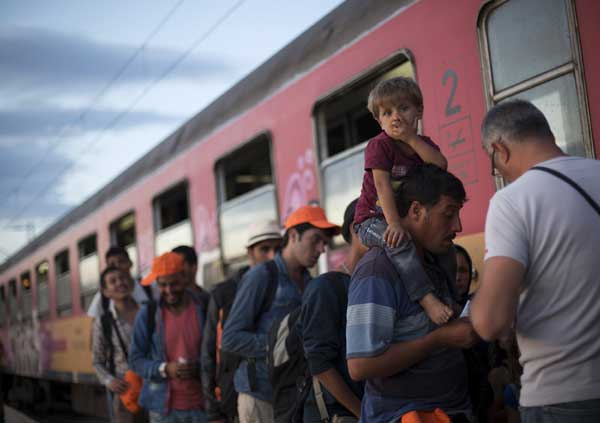US has unshirkable role in addressing refugee crisis
(China Daily) Updated: 2015-09-09 08:16
 |
|
Migrants board a train after crossing the Macedonian-Greek border near Gevgelija, Macedonia, September 6, 2015. [Photo/Agencies] |
As the unprecedented refugee crisis envelops Europe, the international community should step up efforts to provide humanitarian assistance to people fleeing the wars in the Middle East and North Africa.
According to United Nations' estimates, 300,000 refugees, 80 percent of them from Syria, fled across the Mediterranean to Europe between January and August, exceeding the total number of such refugees last year. In all, the number of refugees arriving in Europe, some of whom also came from Iraq, Yemen, Libya and Egypt, is estimated to have reached 1 million.
Such a massive migration is the spillover from the ongoing crises in the Middle East and North Africa where conflicts have displaced tens of millions of people and threatened their basic right to existence.
Some European countries such as Germany have announced plans to take in more refugees and allocated special funds for this purpose. But there have been voices in European countries arguing against taking in the refugees, saying the influx will only aggregate the continent's already bleak economic prospects.
European countries need a greater consensus on making more concerted efforts to help the refugees as one country cannot tackle the problem alone.
It may be unreasonable to demand European countries unconditionally open their doors to the refugees arriving on their doorsteps. But compared with countries such as Turkey and Lebanon which have already sheltered millions of refugees, the West should do more in this regard.
International organizations such as the UN also need to play a bigger role in mobilizing international resources to help relocate the refugees to safe places.
And the international community should address the root cause of the refugee crisis as soon as possible; otherwise, the influx to Europe will only go from bad to worse.
The exodus of displaced people from countries such as Syria, Libya and Iraq has become a grave problem as unrest continues to wreak havoc in these countries. The rise of the Islamic State group has only worsened the security outlook for countries in the region.
The United States needs to shoulder its responsibilities in this regard and put more energy and resources into combating the IS group, and make greater efforts to restore order and stability in countries such as Iraq and Libya where its interventions have fueled the unrest.
And it should rethink its Middle East policy, which has largely led to the ongoing refugee crisis.











